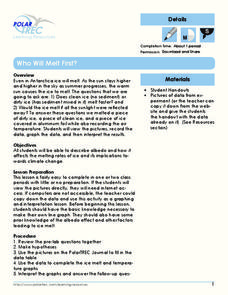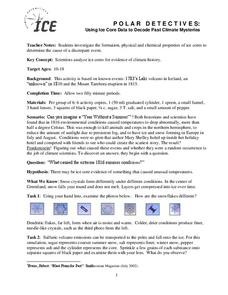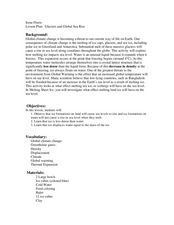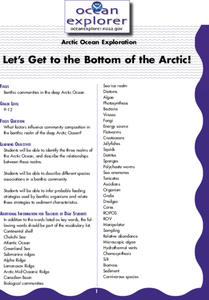Polar Trec
Ice Cores: Modeling Ice Sheets
Ice cores provide scientists with knowledge of historic melt layers, air temperatures, greenhouse gases, and climate stability. Scholars work in groups to build layers representing snow and ice over thousands of years. Then, groups...
Polar Trec
Who Will Melt First?
If the Greenland ice sheet melted, sea levels would rise by about 20 ft; if the Antarctic ice sheet melted, sea levels would rise by 200 ft. Scholars explore ice melting through the analysis of different ice samples, clean and dirty ice....
Polar Trec
Polar Detectives: Using Ice Core Data to Decode Past Climate Mysteries
How does examining an ice core tell us about weather? Learners set up and explore fake ice cores made of sugar, salt, and ash to represent historical snowfall and volcanic eruptions. From their setups, scholars determine what caused the...
Curated OER
Ice Core Clues
Students create a PowerPoint presentation on the information they research about the ice cores and what they tell us about Earth's past. In this ice core lesson plan, students research radioactivity, air pollution, sodium, snowfall...
Curated OER
Fastest Glacier
Students compare and contrast continental ice sheets and a glacier. They discuss how glaciers form. Students research the average winter and summer temperatures for their area. They predict what might happen to the Greenland...
National Wildlife Federation
The Tide is High, but I’m Holding On… Using ICESat Data to Investigate Sea Level Rise
Based on the rate of melting observed from 2003-2007 in Greenland, it would take less than 10 minutes to fill the Dallas Cowboys' Stadium. The 17th instructional activity in a series of 21 has scholars use the ICESat data to understand...
Curated OER
What's Under There?
Learners determine ways to make "observations" about unknowns, such as the land beneath an ice sheet or the interior of the Earth, using tools other than sight. They build "mystery boxes" and exchange them with other groups to "map"...
Curated OER
Getting to the Core of Climate Change
Learners investigate climate changes by graphing and analyzing ice core data from Greenland and Antarctica. They create, explain and report the pattern of data on a graph of ice core data. In addition they find relationships between the...
US Environmental Protection Agency
Sea Level: On the Rise
With the global temperature on the rise, the effects of climate change are starting to be seen. However, many people have a difficult time conceptualizing the long-term effects, such as sea levels rising. Given an easy and effective...
Curated OER
Getting into Hot Water
Young scholars discuss the effect of global warming on bodies of water after reading "An Icy Riddle as Big as Greenland" from The New York Times. Students work in groups to research topics related to global warming and Greenland's...
Curated OER
Glaciers and Global Sea Rise
Students explain how melting glaciers affect global warming. In this earth science lesson, students investigate the change in ice density as it melts. They discuss the human and environmental impact of rising sea levels.
British Council
Weather 2
Young meteorologists answer questions based on the types of weather they experience in the region they live. They also complete a word search to find weather-related terms.
Information is Beautiful
How Many Gigatons of Carbon Dioxide...?
Here is an interesting infographic that presents information on the amount of carbon dioxide we can safely release into the atmosphere compared to the actual amount we have released to date.
Curated OER
Changing Weather: Comparing Climate from Voyageur Times to Today
Fifth graders compare climates. In this weather lesson, 5th graders observe and record weather observations and discuss the impact of weather on people. Students also discuss the concept of global warming and determine how weather...
Curated OER
How Islands Form
Students how islands form, rising water levels, growth of coral, and volcanoes. They complete Island Investigation worksheets after researching island formation on various Internet websites.
Curated OER
Let's Get to the Bottom of the Arctic!
Students identify the three realms of the Arctic Ocean, and describe the relationships between these realms. They describe different species associations in a benthic community.

















